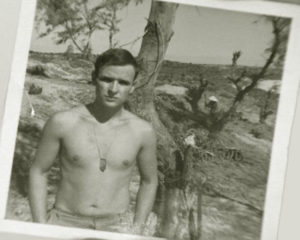
Notes – “The Ghost Soldiers”, “Night Life”, and “The Lives of the Dead”:
“The Ghost Soldiers” is a tale of revenge that becomes softened by rationale. The narrator contracts a case of “diaper rash” from enemy fire, and he nearly dies from shock as the inexperienced medic, Bobby Jorgenson, becomes too stunned to move in the crossfire. The narrator survives, holds a grudge, teems for revenge, but dares not go too far, or risk suffering his own scruples. The narrator and the medic come to an understanding, and water again passes under the bridge. The story “Night Life” explains why Rat Kiley wasn’t the company medic when the narrator was shot for the second time. After one too many nights working the graveyard shift, Rat cracks up and takes himself out of the war. In “The Lives of the Dead”, the narrator makes final reflections of those he once knew. He was no stranger to loss and grief before the war as he makes known that his childhood love died of cancer before the age of ten. Death becomes a parallel for lost literature . . . books nobody reads . . . stories nobody listens to . . . the moral.
Quotes – “The Ghost Soldiers”:
“I was shot twice. The first time, out by Tri Binh . . .” (180)
“It was almost dark when the fighting ended and the chopper came to take me and two dead guys away.” (181)
“. . . I got shot the second time, in the butt, along the Song Tra Bong . . .” . . . . “. . . [Bobby Jorgenson] bungled the patch job, and a couple of weeks later my ass started to rot away.” (181)
Small pride of getting shot, “Diaper rash, the nurses called it.”(182)
“. . . Bobby Jorgenson had almost killed me. Shock, I’d think – how could he forget to treat for shock?” (183)
“They were still my buddies, at least on one level, but once you leave the boonies, the whole comrade business gets turned around. You become a civilian. You forfeit membership in the family, the blood fraternity, and no matter how hard you try, you can’t pretend to be part of it.” (185)
Cynically: “‘Where’s my good buddy Bobby [Jorgenson]?’” (186)
“‘Well, hey,’ Bowker said, ‘I’m just saying what Jorgenson says. Maybe fuckin’ polio. Or that weird elephant disease. Elephantiass-hole or whatever.’” (187)
Bullet wound jokes: “There was one about rear guard duty. There was another one about hemorrhoids and how I had trouble putting the past behind me.” (188)
“‘Sanders shrugged. ‘People change. Situations change. I hate to say this, man, but you’re out of touch. Jorgenson – he’s with us now.’” (188)
“I didn’t fit anymore. They were soldiers, I wasn’t.” (188)
“. . . for some reason what stuck to my memory was the smooth unblemished leather of his fine new boots. Factory black, no scuffs or dust or red clay. The boots were one of those vivid details you can’t forget. Like a pebble or a blade of grass, you just stare and think, Dear Christ, there’s the last thing on earth I’ll ever see.” (189)
“I hated [Jorgenson] for making me stop hating him.” (190)
“I’d turned mean inside.” (190)
“Shock, I thought, and I tried to tell [Jorgenson] that, but my tongue wouldn’t make the
connection” (191)
“We called the enemy ghosts.” . . . . “To get spooked, in the lingo, meant not only to get scared but to get killed.” (192)
“. . . at night you turned into a believer: no skeptics in foxholes.” (193)
“‘What’s real?’ [Azar] said. ‘Eight months in fantasyland, it tends to blur the line. Honest to God, I sometimes can’t remember what real is.’” (193)
“. . . the darkness squeezes you inside yourself, you get cut off from the outside world, the imagination takes over. That’s basic psychology.” (195)
“Ghosts rising from the dead.” (195)
“Waiting was the trick.” (196)
Barbarella: Azar: “Sweet Janie boosts a man’s morale.” . . . . “It was an old joke. Everything was old. The movie, the heat, the booze, the war.” (196)
Barbarella (1968) Trailer (YouTube)
“. . . all those heroes, and you can’t help falling back on them as models of proper comportment.” (197)
“Like a puppeteer. Yank on the ropes, watch the silly wooden soldier jump and twitch.” (198)
“I was Nam – the horror, the war.” (199)
“Shut up and listen.” (199)
“We sat in the dim light of my hootch, boots off, listening to Mary Hopkin on my tape deck.” (199)
Mary Hopkin – Those Were the Days (YouTube)
“That’s another thing Nam does to you. It turns you sentimental . . .” (199)
“I told [Azar] the score was even.” (201)
Azar: “‘Out here, at night, I almost feel like a kid again. The Vietnam experience. I mean, wow, I love this shit.’” (202)
Azar: “‘Brings back memories, I bet – those happy soldiering days. Except now you’re a has-been.’” (202)
“I told him I was sorry; he told me the same thing. Afterward, in an awkward moment, I said, ‘Let’s kill Azar.’” (207)
Quotes –”Night Life”:
“Apparently [Rat Kiley] lost his cool.” (208)
“. . . the phrase everyone used: the night life. A language trick. It made things seem tolerable. How’s the Nam treating you? . . . . Hey, one big party, just living the night life.” (208)
“You’d shake your head and blink, except you couldn’t even tell you were blinking, the blackness didn’t change.” (209)
“Rat developed some peculiar habits.” (210)
“One of these nights I’ll be lying dead out there in the dark and nobody’ll find me except the bugs – I can see it – I can see the goddamn bugs chewing tunnels through me – I can see the mongooses munching on my bones.” (212)
“He said he’d done his best. He’d tried to be a decent medic. Win some and lose some, he said, but he’d tried hard.” . . . . “and how crazy it was that people who were so incredibly alive could get so incredibly dead.” . . . . “‘This whole war,’ he said. ‘You know what it is? Just one big banquet. Meat, man. You and me. Everybody. Meat for the bugs.’ The next morning he shot himself. He took off his boots and socks, laid out his medical kit, doped himself up, and put a round through his foot.”(212)
Quotes –”The Lives of the Dead”:
“They’re all dead. But in a story, which is a kind of dreaming, the dead sometimes smile and sit up and return to the world.” (213)
“. . . that awesome act of greeting the dead.” (2214)
Sanders: “‘Vitamin C,’ he said gently. ‘A guy’s health, that’s the most important thing.’” (215)
“There was a formality to it, like a funeral without the sadness.” (215)
“[Kiowa] offered me a Christmas cookie from a batch his father had sent him. It was February now, but the cookies tasted fine.” (215)
“The thing about a story is that you dream it as you tell it,” (218)
“‘How’s the war today?’ somebody would ask, and Ted Lavender would give a little smile to the sky and say, ‘Mellow – a nice smooth war today.’” (218)
“We put his personal effects in a plastic bag and tied the bag to his arm.” (218)
“The movie that night was The Man Who Never Was.” (220)
“We were in love. Nine years old, yes, but it was real love . . .” (221)
Linda’s cap: “So I stood off to the side, just a spectator, wishing I could do things I couldn’t do.” (221)
“[Nick Veenhof] took hold of the white tassel, stood up, and gently lifted off her cap.” (222)
“. . . I can still see the glossy whiteness of her scalp. She wasn’t bald. Not quite. Not completely. There were some tufts of hair, little patches of grayish brown fuzz.” (222)
“She died, of course. Nine years old and she died. It was a brain tumor.” (223-4)
“But in a story I can steal her soul. I can revive, at least briefly, that which is absolute and unchanging.” (224)
“‘Well, God,’ I said, ‘you’re dead.’” (225)
“I learned that words make a difference. It’s easier to cope with a kicked bucket than a corpse; if it isn’t human, it doesn’t matter much if it’s dead.” (226)
“‘Death sucks,’ [Sanders] said.” (230)
“‘Do I look dead?’” . . . . “‘Well, right now,’ she said, ‘I’m not dead. But when I am, it’s like … I don’t know, I guess it’s like being inside a book that nobody’s reading.’” (231)




